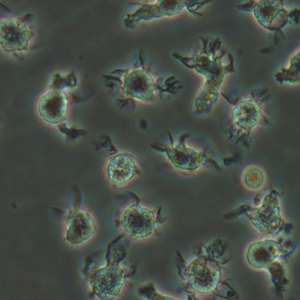Aug. 4, 2006 Research Highlight Biology Medicine / Disease
Regulating shock: immune cells that protect
Researchers find that an immune cell can protect against a deadly form of inflammation
 Figure 1: Morphology of dendritic cells
Figure 1: Morphology of dendritic cells
When immune responses are effective against a viral or a bacterial infection beneficial amounts of inflammation occur, leading to elimination of the pathogen but also to some familiar side effects, including fever, chills and muscle aches. In rare situations, however, inflammatory responses can build to the danger point, called shock. Sepsis—a type of shock—occurs when inflammation is systemic and dangerous, potentially leading death. In the May 1st issue of Blood 1, Katsuaki Sato and colleagues at the RIKEN Research Center for Allergy and Immunology in Yokohama describe a type of immune cell that can protect against shock, which, in principle, could be used clinically to treat this deadly form of ‘hyper’ inflammation.
The immune cells in question are a subtype of dendritic cells, a family of cells that act as immune sentinels and initiate immune responses (Fig. 1). Of the several subtypes of dendritic cells, Sato and colleagues work with ones that, instead of priming immune responses via expression of particular cell surface molecules, promote immune suppression in other immune cells. Using various mouse models of septic shock, the authors show that mice given the so called ‘regulatory’ dendritic cells before inducing shock prevents it.
How the regulatory dendritic cells mediate the suppression is through production of cytokines such as interleukin 10. Cytokines are intercellular mediators of immune responses. In certain circumstances, interleukin 10 reduces inflammation. Moreover, production of interleukin 10 is correlated with known intracellular signalling pathways in the regulatory dendritic cells that are associated with suppression. Thus, unlike their stimulatory cousins, regulatory dendritic cells are ‘programmed’ to provide suppression signals to other immune cells.
A frequent cause of septic shock is the accumulation of high amounts of bacterial components that over-stimulate the immune system. Infections that initially cause appendicitis, for example, can lead to an infection called peritonitis that is caused by bacterial invasion of the gut. If untreated, peritonitis can cause excessive stimulation of gut cells, sepsis and death. Sato and colleagues test the ability of regulatory dendritic cells to prevent shock in a mouse model of peritonitis that closely resembles the clinical syndrome in humans and find them to provide significant protection.
The therapeutic implications of the work by Sato and colleagues include clinical use of the regulatory dendritic cells in patients who suffer from acute shock. In principle, the dramatic effects seen in the mouse models mean that similar results could be seen in humans.
References
- 1. Fujita, S. et al. Regulatory dendritic cells act as regulators of acute lethal systemic inflammatory response. Blood 107, 3656–3664 (2006). doi: 10.1182/blood-2005-10-4190
